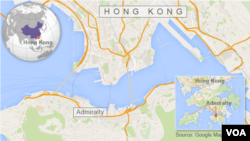Hong Kong police have warned protesters they have until Thursday to clear the territory's remaining protest sites, in what may bring to an end more than two months of pro-democracy demonstrations.
Police spokesman Cheung Tak-keung urged the demonstrators to start removing obstacles at the protest sites and leave peacefully so the roads can be reopened.
He said police will not tolerate any violence and will take action against "radicals and troublemakers."
Police are set to move in after a ruling by Hong Kong's High Court gave authorities permission to tear down street barricades, tents and other obstructions from the protesters' main camp in the Admiralty district near government headquarters.
The injunction was published Tuesday in local media, which reported that thousands of police will work Thursday with bailiffs to clear the tent city. The order only gives permission to dismantle a portion of the Admiralty site, but authorities are expected to clear the entire area and reopen traffic.
The South China Morning Post reports police will also break up a separate, smaller protest site in the popular shopping district of Causeway Bay.
The moves sets the stage for a possible final showdown between police and protesters, who have repeatedly clashed during past attempts to clear the sites.
Only dozens now remain at the protest sites. At one point, tens of thousands participated, calling for fully democratic elections for the city's top leader in 2017.
Protest organizers have been split on whether to continue the demonstrations, amid fears of further clashes between police and protesters. The Hong Kong Federation of Students, a key protest organizer, has said it will soon decide whether to call its students off the streets.
Hong Kong, a former British colony, was returned to China in 1997. Its citizens still enjoy many freedoms not allowed on the mainland.
But authorities have refused to hold free elections, insisting all candidates for chief executive be approved by a committee made up mainly of people loyal to Beijing.
Material for this report came fromAP, AFP and Reuters.








